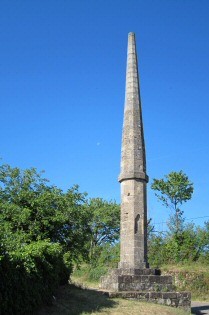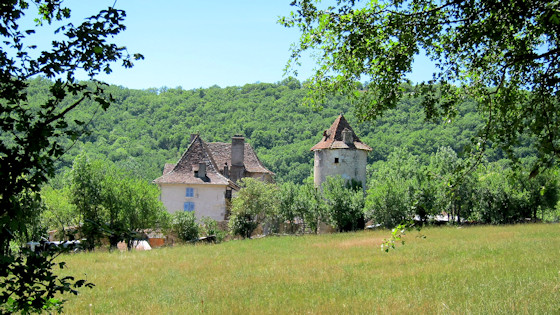Early in the morning we left our quarters in Figeac, first along the river. But soon the path leads uphill and we could admire Figeac from above.

This striking obelisk "Aiguille de Cingle" dates from the 13th century. The obelisks were used to mark the boundaries of Figeac Abbey.
There are many such stone houses here. They were used as a shelter for the field workers during thunderstorms.
The donkeys look curiously at the pilgrims taking photographs.
The village of Faycelles is reached. Here we take a break and visit the church.
St. James is omnipresent! This wooden statue stands in the church.
To make the middle stained glass window in the choir of the church of Faycelles shine so beautifully, I had to do a little trick (two photos). On the left side in the front there is the figure of St. Thérèse of Lisieux.
Again and again we see the typical stone houses.
Still one km to the midday rest in Beduer
On the square in front of the church under shady trees we had our midday picnic.

In Beduer we left the GR 65 pilgrim trail and walked back to the Célé valley on the trail 651.

Past some romantic little castles ...
... we come to Corn.
Time for a short church tour.
In front on the right, St. Thérèse of Lisieux welcomes us.
We haven't seen one for a long time.
Along the river the path leads via Ste. Eulalie through boxwoods to the finish in Espagnac.
Espagnac
Between 1130 and 1140 a wandering monk founded the first monastery in Espagnac. It was already destroyed in 1160 during the war with England. In 1211 an Augustinian nunnery was founded by Prioress Elisabeth. A church and several buildings were built on the left bank of the Célé. However, this place turned out to be unsuitable, it was flooded several times. Around 1624, Hebrard Aymeric Saint-Sulpice, bishop of Coimbra (Portugal), had new buildings built. These were officially opened on 16 May 1293. At the bishop's order, the abbey was consecrated to the Blessed Virgin Mary. It is called Val-Paradis d'Espagnac. The religious community of nuns remained active for almost ten centuries until the convent was dissolved in 1792 during the French Revolution.
A hostel is located in the former monastery. In front of it there is a huge wooden statue of St. James of recent times.